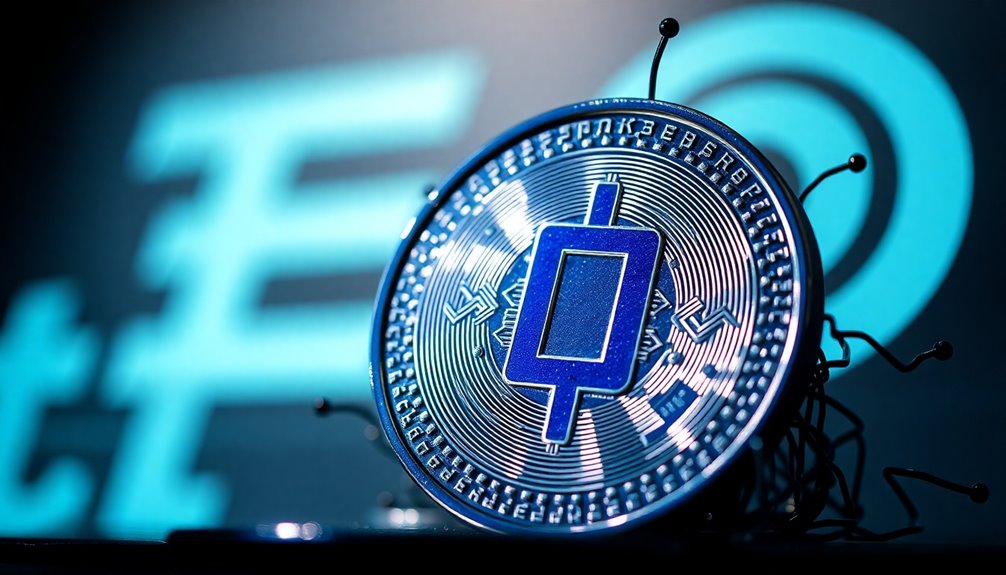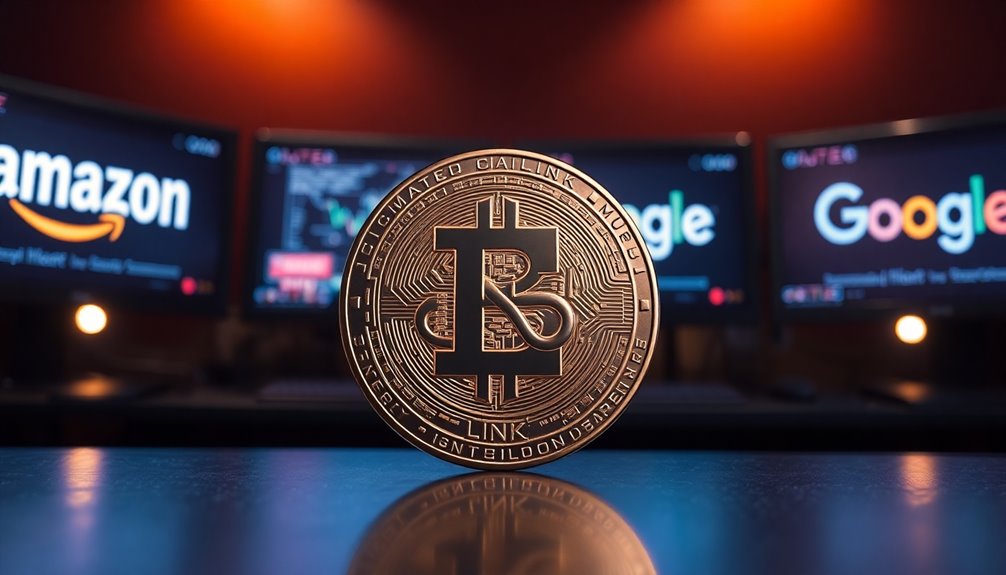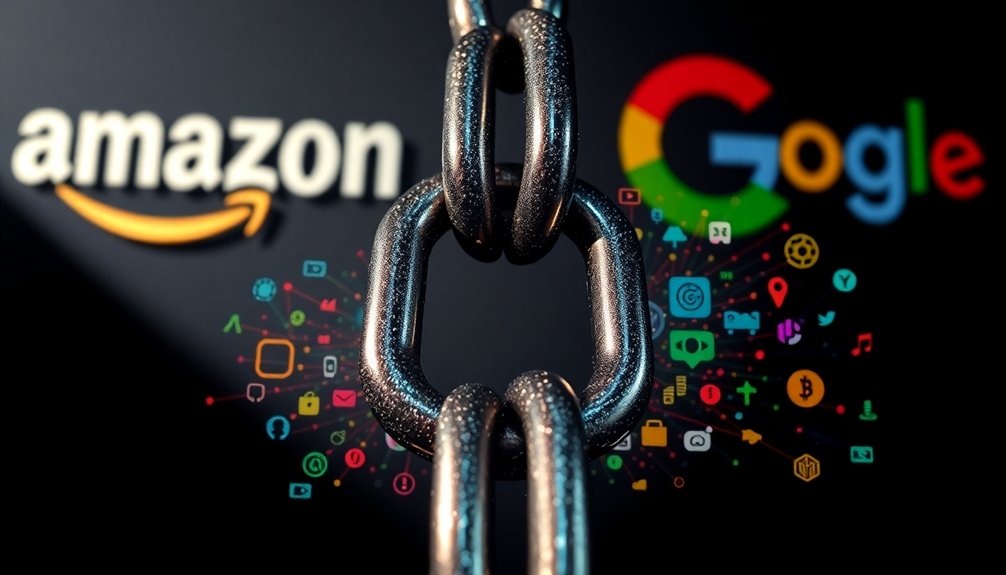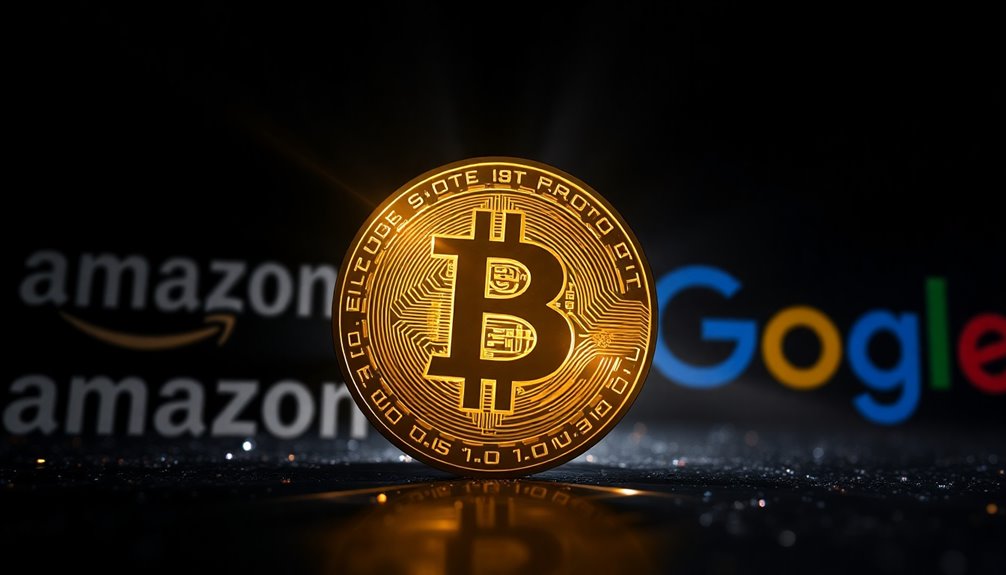Chainlink (LINK) is revolutionizing the blockchain world by connecting smart contracts with real-world data through its decentralized oracle network. This capability gives it a significant edge over tech giants like Amazon and Google, as they rely on centralized data systems. With over 60% of the oracle market share, Chainlink's secure and reliable data delivery poses a competitive threat. The LINK token guarantees accountability among node operators, further solidifying its reputation. As Chainlink continues to expand into various sectors like DeFi and insurance, you'll see how it's changing the game for traditional players in the market.
Key Takeaways
- Chainlink's decentralized oracle network challenges traditional data providers, potentially disrupting Amazon and Google's dominance in data services.
- With over 60% market share, Chainlink's lead in decentralized oracles threatens to undermine the competitive edge of tech giants.
- Chainlink's partnerships with major companies enhance its credibility, making it a formidable competitor against established tech firms.
- The ability of Chainlink to automate and secure data transfers reduces reliance on centralized services, posing a threat to Amazon and Google.
- Chainlink's innovative technologies, like Cross-Chain Communication Protocol, widen its utility across multiple blockchains, increasing its appeal and market presence.
Understanding Chainlink and Oracles

Chainlink is revolutionizing how blockchains interact with real-world data through its decentralized oracle network. By connecting blockchains to off-chain data, Chainlink empowers smart contracts to automate data transfers securely and reliably. Hosted on the Ethereum platform, it utilizes a proof-of-stake protocol, supporting hybrid smart contracts that blend on-chain code with off-chain data infrastructure.
At its core, Chainlink employs a network of independent entities, known as oracles, that gather data from multiple sources. When a smart contract needs information, Chainlink matches the request with trustworthy node operators, who retrieve and return the data. To guarantee accuracy, Chainlink analyzes responses from each oracle and implements a reputation system that promotes reliability. Additionally, Chainlink's solution addresses the challenge of smart contracts accessing reliable external data, which is crucial for their functionality.
Users draft a Service Level Agreement (SLA) detailing their data needs, and oracles connect to external data sources to fulfill those requirements. The Aggregation contract evaluates the validity of data points, returning a weighted score for accuracy. This meticulous process safeguards smart contracts, protecting them from malicious or inaccurate data. With applications across DeFi, insurance, gaming, and more, Chainlink stands as an essential bridge between traditional systems and blockchain networks.
The Role of LINK Token

The LINK token serves as the lifeblood of the Chainlink network, powering its various functions and interactions. As the primary means of value transfer, it facilitates payments to node operators for providing and verifying data requested by smart contracts. Node operators set prices for their services based on demand and market conditions, ensuring that transactions within the Chainlink ecosystem run smoothly.
Incentivizing node operators is essential for maintaining data integrity. By rewarding them with LINK tokens for accurate data collection, the network encourages high-quality performance. Operators must stake LINK tokens as collateral, demonstrating their commitment and trustworthiness. If they fail to provide accurate data, they risk losing their staked tokens, reinforcing accountability. Additionally, the LINK token's economic model encourages high-quality data provision by node operators, further enhancing the reliability of the Chainlink network.
Additionally, the LINK token's utility extends beyond payments. Built on the Ethereum blockchain, it allows seamless data transfer alongside token transactions, enhancing smart contract interactions. As demand for Chainlink's oracle services grows, so does the value of LINK tokens. With the potential for decentralized governance, LINK token holders can influence network decisions, making it central to the Chainlink ecosystem's success.
How Data Delivery Works

In the Chainlink ecosystem, data delivery plays an essential role in guaranteeing that smart contracts receive accurate and timely information. This process involves several key components that work together seamlessly. You'll find that data is collected from various blockchain networks, accessed through node APIs, and retrieved using blockchain explorers. Oracles like Chainlink take it a step further by gathering external data and feeding it directly into smart contracts.
To facilitate efficient data integration and delivery, consider these important aspects:
- ETL Processes: They guarantee blockchain data is structured and ready for analysis. Additionally, the composable nature of blockchain data supports the development of data-driven applications that enhance overall functionality.
- Real-time Event Monitoring: This allows for automated workflows based on specific conditions.
- Scalable Solutions: They handle large volumes of data efficiently.
- Interoperability: This enables seamless data transfer between different blockchain networks.
Diverse Use Cases of Chainlink

Numerous industries are leveraging Chainlink's capabilities to enhance their operations and services. From decentralized finance (DeFi) to gaming, insurance, and real estate, Chainlink's diverse use cases are transforming how businesses operate. Additionally, Chainlink operates on the Ethereum platform, which further enhances its integration capabilities with existing blockchain applications.
Here's a quick look at some notable applications:
| Industry | Use Cases |
|---|---|
| Decentralized Finance | Provides accurate market data for lending and trading. Supports synthetic asset platforms. |
| Gaming and NFTs | Guarantees fairness with verifiable randomness for game results and NFT distributions. |
| Insurance | Automates payouts based on predefined conditions, minimizing claims processing. |
| Real Estate | Verifies property details and ownership records to enhance transaction transparency. |
In the DeFi space, platforms like Aave and Synthetix rely on Chainlink for accurate market data, enabling reliable lending and borrowing. In gaming, its Verifiable Random Function (VRF) guarantees fairness and transparency, while in real estate, it reduces fraud risks through automated verification processes. Chainlink's versatility allows it to secure connections across various industries, making it an essential tool for modern digital ecosystems.
Security Features of Chainlink

Chainlink's diverse applications across various industries rely heavily on robust security features that protect the integrity of the data being used. The decentralized oracle network eliminates single points of failure, making it resistant to manipulation. Multiple oracle nodes gather data from various sources, ensuring accuracy and reliability. This network comprises high-quality, Sybil-resistant nodes, all incentivized by the native LINK token to maintain integrity. In addition, Chainlink's ability to connect smart contracts to real-world data enhances its utility in securing off-chain computations.
Key security features include:
- Staking Mechanism: Node operators stake LINK tokens as collateral, which they can forfeit for faulty data, aligning their interests with network security.
- Defense-in-Depth Approach: Chainlink employs multiple security solutions, enhancing the robustness and reliability of the oracle network.
- Performance Transparency: Users can access performance metadata of nodes, promoting accountability and trust.
- Verifiable Data Sources: The network validates data from multiple sources and provides cryptographically secured randomness, ensuring trustworthiness.
These features create a resilient framework, making Chainlink a trusted player in the decentralized finance landscape. By prioritizing security, Chainlink empowers developers and users alike, fostering confidence in smart contracts and their applications.
Chainlink's Growing Adoption

As the demand for decentralized solutions grows, Chainlink continues to expand its adoption across various blockchain networks. You'll find that Chainlink has integrated its services with 12 different blockchains, including Ethereum, BNB Smart Chain, and Avalanche. Recent partnerships with Metis, Goldlink Finance, and others showcase the versatility of Chainlink's offerings, contributing to its ongoing tokenization agenda. Additionally, the increased adoption by platforms focusing on tokenization highlights Chainlink's growing influence in the market.
Chainlink's impact on real-world assets (RWAs) and stablecoins is significant. Its decentralized oracle infrastructure has facilitated over $9.5 trillion in transaction value across the Web3 economy. With Chainlink Data Feeds providing accurate and tamper-proof data, you can trust the information about tokenized assets on-chain. Chainlink Functions enhance these assets with real-world information, while Chainlink Automation guarantees smart contracts remain up-to-date. Furthermore, the rise of solar energy solutions has led to innovative approaches in integrating real-world data with blockchain technology.
The growing adoption is evident in the participation of leading DeFi protocols and financial institutions like Paxos and Vodafone. Additionally, Chainlink's Cross-Chain Interoperability Protocol (CCIP) allows secure transactions across various blockchains, eliminating liquidity silos. As more addresses are created and the ecosystem expands, you can see why Chainlink's adoption continues to rise, solidifying its role in the decentralized finance landscape.
Competitive Edge Over Tech Giants

In a rapidly evolving blockchain landscape, Chainlink stands out with a competitive edge that tech giants struggle to match. Its strategic partnerships and decentralized infrastructure position it as a formidable player in the oracle space. While Amazon and Google focus on traditional tech solutions, Chainlink leverages collaborations with influential names like SWIFT and Google Cloud, enhancing its credibility and expanding usability. This robust network of alliances not only highlights Chainlink’s growing influence but also solidifies its role as a critical bridge between blockchain platforms and real-world data. Its innovative approach has propelled it to a leadership position, even as the founder takes over at Chainalysis, sparking speculation about new synergies and integrations within the broader blockchain ecosystem. Such developments underscore the accelerating convergence of decentralized technologies and traditional industries, with Chainlink at the forefront of this paradigm shift.
Here are some key aspects of Chainlink's competitive advantage:
- Decentralized Security: Operates on a network of nodes, reducing the risk of single-point failures.
- Market Leadership: Holds over 60% of the decentralized oracle market share, establishing itself as a leader.
- Innovative Technology: Introduces Cross-Chain Communication Protocol (CCIP) and decentralized oracle networks (DONs) for enhanced scalability. This innovative approach allows the use of real-world data within smart contracts, further solidifying its position in the market.
- Robust Ecosystem: Supports over $6.9 trillion in transaction value, integrating critical data for DeFi applications and stablecoins.
Future Implications for Blockchain

The ongoing advancements in blockchain technology hint at a transformative future across various sectors. With oracles like Chainlink leading the way, you're looking at enhanced financial instruments that can dynamically adjust to real-world conditions. Imagine derivatives linked to stock prices or insurance policies triggered by weather events, making financial transactions not just smarter but also more efficient. Smart contracts are deterministic; external data can disrupt blockchain integrity, making oracles crucial for maintaining reliability.
In supply chain and logistics, oracles automate processes, reduce risks, and improve transparency. They integrate IoT data to monitor everything from transportation speed to storage conditions, ensuring you have real-time visibility over goods. This automation enhances trust, making global trade smoother.
When it comes to decentralized governance and identity, oracles empower you to participate in secure voting and identity verification without centralized vulnerabilities. This autonomy over your personal data fosters trust in decentralized systems.
Frequently Asked Questions
How Does Chainlink Ensure Data Accuracy and Reliability From Oracles?
Chainlink guarantees data accuracy and reliability by utilizing a decentralized network of oracles. You'll see that multiple oracles collect, verify, and deliver data, which minimizes single points of failure. Each oracle's performance is tracked through a reputation system, and node operators stake LINK tokens as collateral. This creates economic incentives for accurate data provision. The aggregation of data from various oracles further guarantees consistency and trustworthiness, enhancing overall network reliability.
What Are the Potential Risks of Using Chainlink Oracles?
Did you know that around 70% of smart contracts rely on data from oracles? Using Chainlink oracles, you face several risks. Network congestion can delay data transmission, while centralized oracles expose you to fraud. If data sources aren't diversified, you might receive manipulated information, leading to financial losses. Additionally, relying heavily on one project increases systemic risk, making it essential to understand the vulnerabilities before integrating these oracles into your systems.
How Can Developers Integrate Chainlink Into Their Applications?
To integrate Chainlink into your applications, start by drafting a Service Level Agreement (SLA) that outlines your data requirements. Then, submit the SLA and deposit LINK tokens in the Order-Matching contract. Oracles will bid to fulfill your request based on the SLA. Once selected, oracles fetch data from external sources, process it, and send it back to your smart contract. This guarantees reliable and accurate data for your decentralized application.
What Is the Future Outlook for LINK Token Value?
The future outlook for LINK token value looks promising, considering its growing use cases and technological advancements. As you explore decentralized applications, you'll find Chainlink's role in providing reliable data increasingly essential. Economic incentives and staking mechanisms encourage strong participation from node operators, further boosting the network's integrity. If market demand continues to rise and regulatory landscapes remain favorable, you might see significant appreciation in LINK's value over time.
Are There Any Competitors to Chainlink in the Oracle Space?
Imagine traversing a bustling market filled with vendors, each offering unique goods. In the oracle space, Chainlink isn't the only player. You've got Band Protocol, which provides cross-chain data; DIA, focusing on transparent DeFi data; and Tellor, ensuring data accuracy through miners. Other competitors like API3 and Nest Protocol also enhance your options. With such a variety, you can find the right oracle solution tailored to your decentralized application needs.









